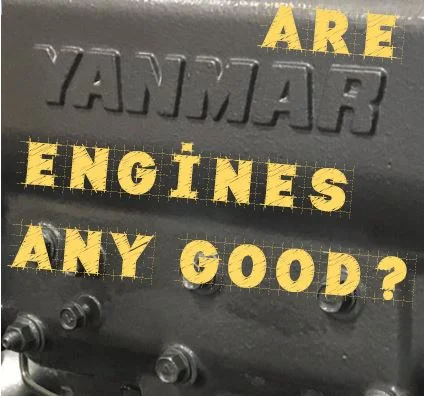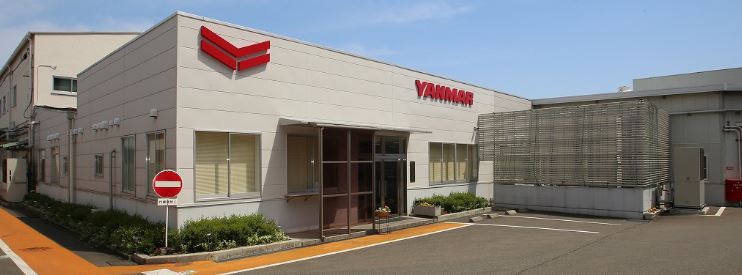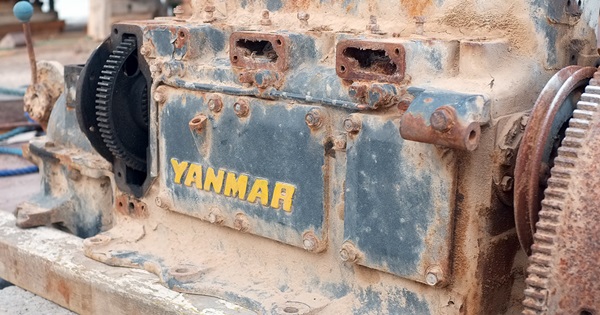
Spend any time around boat owners, boatyards or pontoons and you’ll soon hear the question, “Are Yanmar marine diesel engines any good?” Well – do you remember the series of “I’m a Mac – I’m a PC” adverts from the late 2000s? Sometimes the sailboat owners can appear just like the characters in those adverts. Users of a particular brand of engine seem quietly confident that their technology is superior in every way to all alternatives.
Confirmation Bias is the phenomenon where we seek information to confirm how we already feel and ignore information that contradicts that opinion. Sometimes we just want to hear the engine powering our pride and joy is the long-standing holder of the world’s best ever engine, ever title.

So let’s get back to that question: “Are Yanmar marine diesel engines any good?” To be clear; all engines require a full schedule of maintenance to remain at their best and every manufacturer will have had, down through the years, their hits and their misses. But generally speaking, marine diesel engines from any mainstream manufacturer tend to be reliable.


That said, Yanmar are widely considered to produce very reliable and long-lasting marine diesel engines. Provided that the boat owner is conscientious about regular maintenance; changing filters, impellers and hoses as specified in the manual; cleaning the fuel if and when required and changing the oil on a regular schedule, a Yanmar marine diesel engine should last you 30 years and run happily for 10,000 hours.
Both sailboat owners and marine diesel mechanics alike are tremendously fond of Yanmar diesel engines, especially the older naturally aspirated versions. Without the complication of common-rail injection and turbos, they are trusted workhorses which, if treated well, will just keep going and going. They are easy to work on and most of the common service parts are available in non-OEM variants saving money on maintenance.
Who Manufactures Yanmar Marine Diesel Engines?
Yanmar Co., Ltd. is a Japanese diesel engine manufacturer. They were founded in Osaka, Japan in 1912 where they still design and manufacture their own engines. Since 2000 their main manufacturing plant has been at “Tsukaguchi Factory” in Osaka. Yanmar designs engines for a wide range of applications, including seagoing vessels, pleasure boats, construction equipment, agricultural equipment and generator sets. It also manufactures and sells agricultural equipment, construction equipment, climate control systems, aqua-farming systems, in addition to providing a range of remote monitoring services.

Notably, in 1933 Yanmar produced the world’s first practical, small diesel engine and in 1992 they produced their 10 millionth diesel engine. Yanmar’s small marine diesel engines, like those used in countless sailboats around the globe, are not simply marinized versions of industrial engines. They have been designed specifically for the application down to the choice of casting materials optimized for use in a salt-water environment.
What is Yanmar’s After Sales Service like?
Yanmar is a large multi-national organisation. In order to distribute their engines around the world, they have a huge network of local distributors. So, if you purchase a Yanmar engine you will be dealing with your local distributor rather than with Yanmar directly. Yanmar is set up that these local distributors are basically an arm of Yanmar. They have to meet required standards and are certified. All after-sales is also provided by these local distributors, whether or not they supplied the engine originally. While some owners have reported issues, specifically when dealing with service technicians who didn’t supply their engine or in out-of-warranty disputes, the vast majority of feedback is that Yanmar’s after-sales service is excellent and they quickly and efficiently sort out issues that arise within the warranty period. The standard warranty lasts for two years with a free three year extension for most small marine models. See here for details.
Are Yanmar Spare Parts Expensive?
There are a couple of things that we must consider before diving in to the cost of parts. Firstly, small marine Yanmar’s are very easy to work on and very reliable. Servicing costs will be low or, even better, services will carried out by the owner. Many of the service parts are available as OEM replacements and therefore very cost effective. Yanmar service parts such as gaskets that are not available as OEM replacements are generally not too expensive. Then there is the reliability – the reality is that many owners will never need a non-service part throughout their ownership of the engine. Careful maintenance makes this even more true. Parts such as starter motors can generally be found cheap as they are common to industrial Yanmar engines. Exhaust elbows can be bought as OEM.
So that all said, all marine diesel are expensive to repair. Some brands price their parts way more than others and many owners and mechanics would consider Yanmar parts right in the middle of the price range. Many Yanmar owners would put it this way; they are not as expensive as Volvo Penta parts.
Are Yanmar Spare Parts Easy to Find?
Yanmar have a global network of dealers with many sailors reporting that they have easily found suppliers for Yanmar OEM parts in far flung cruising grounds around the Caribbean, the Mediterranean and much further afield. These days, all parts can be found on the internet and shipped globally. All older engines are well supported and many parts such as alternators and injectors can often be rebuilt. Cylinders can reportedly be easily sleeved if necessary.


Are Yanmar Engines Fuel Efficient?
Marine Diesel engines tend to be designed less for fuel efficiency and more for reliability and longevity which is sensible given their operating environment. Automotive engines have gained impressive levels of efficiency by utilizing turbos, common rail injection and very high operating temperatures. None of these is essential in a small marine diesel for propelling a medium sized family sailboat.
Yet, despite not being designed for maximum efficiency, it is quite easy to get your sailboat up to hull speed. After all, the sails can do it in relatively low winds. Therefore, you shouldn’t expect to use too much fuel. A common rule of thumb for marine diesels is twenty horsepower-hours from a gallon of diesel.
If this was accurate, and you were running your Yanmar 2GM20 (with a 20 HP maximum output at 3000 rpm) at 75% power (2250 rpm), then you could expect to use ¾ gallon of fuel (2.8 Litres) per hour. Users report that this engine uses about 30% less than that. So, empirical evidence would suggest that Yanmars are above average for fuel efficiency.
What is the Life Expectancy of a Yanmar Marine Diesel Engine?
Many sources state that the average life expectancy of a small marine diesel engine is approximately 5000 hours. This figure, however, may vary based on the regularity and quality of usage, and how well and how often the user maintains the engine. If well maintained and revved properly throughout the engine’s life, a Yanmar Marine Diesel should last well in excess of 8,000 to 10,000 hours. Many owners of the Yanmar GM series and, particularly, the 4JH series engines remain convinced that their engines will last forever.
Are Yanmar Engines Quiet?
There is certainly a balance in diesel engines between quiet sophistication and dogged reliability. Foe many years, Yanmar fell decidedly on the side of reliability. The GM series engines, for example, were hand crank-able and therefore the compression ratio was lower than equivalent engines from other stables. This led to a noisy reliability that some owners love. Others, perhaps with better hearing, found them too noisy. The newer YM series engines don’t suffer the same but the fact that Yanmar kept hand crank-able engines on the go for so long, and their cement mixer heritage would suggest that quietly purring engines are not their top priority.
What Common Issues Do I Need to Look Out for?
Every marine diesel engine manufacturer has their foibles. So what do you need to keep a lookout for in Yanmar diesels? The first thing that springs to mind is the exhaust elbows. Yanmar have gone through waves of fabricating these out of mild steel (which rusts), stainless steel (which causes galvanic corrosion) and aluminium. Whichever is on your engine deserves at least an annual inspection and you should expect to replace them every five or so years.
Many of Yanmar’s engines have raw-water cooling. This is not necessarily a negative as it means that the cast iron head and block tend to be made from the best ore available but the internal anodes must be replaced regularly.
Finally, Yanmar have a reputation for using soft metal bolts when building their engines. They may have a good reason for doing this, but there are countless stories of folk shearing bolts when removing parts and heads. So much so, in fact, that many people say;
Yanmar make great engines cleverly held together with chocolate fastenings
Anon.
Conclusion
So are small Yanmar Marine Diesel engines any good? No engine, or engine producer, is perfect but users and engineers find Yanmar Engines to be reliable, long-lasting and fuel-efficient. They have an excellent network of accredited dealers and service centers with knowledgeable staff, they’re easy to service and parts are readily available and averagely priced. Aside from a few foibles, yes, Yanmar Diesels are excellent.




A smart skipper learns from the lessons of others.
In our Yanmar GM Series Almanac section, we have a series of previous questions and queries from Yanmar GM owners along with answers. Many of these have been adapted from discussions on the “Yanmar Marine Engine Owner’s Group – Repair and Discussion” Facebook group which is a fantastic resource for getting help.
- White Smoke & Black Water from a Yanmar 2GM20
- KM2P Transmission Oil level question – please can someone help?
- Yanmar 1GM won’t go over 2700 RPM
- This Yanmar 2GM20 only started with one decompression lever engaged
Do you want to get future Yanmar GM Series Almanac articles straight to your inbox? Sign up to our Yanmar GM Series Owners’ Group today and we’ll make sure that you’re first to see them. And we definitely won’t share your email address with anyone else.
